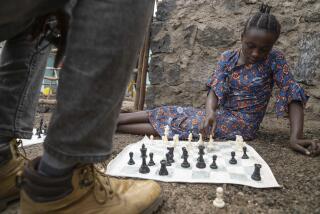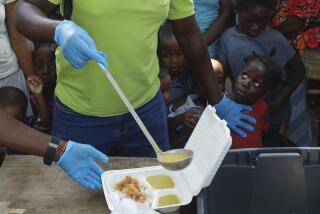Former Somalia refugee makes it his mission to help others
The barefoot Somali boy sat by an irrigation canal just beyond the camp that was his world, staring into the dirty, stagnant water.
Why was his life so wretched?
That day, Maulid Warfa had seen a school in a nearby town with real desks and chairs. The contrast with his refugee camp school, a bare hut with a leaking roof, seemed unbearable.
“I remember sitting, thinking, ‘Why? Why am I going to this school that doesn’t even have chairs and doesn’t even have a proper roof?’
“I thought, ‘When I grow up, I want to make a lot of refugee schools and make sure that no child goes without a desk and a chair.’”
Now, as a UNICEF emergency specialist, Warfa works in one of the most dangerous countries on Earth, struggling to reach people in remote settlements of famine-stricken southern Somalia against the wishes — and guns — of a pitiless Islamist militia.
Warfa, 43, has been ambushed twice and kidnapped once. His best friend, another aid worker, was killed. Other close colleagues, including some he recruited into aid work, were killed or abducted and never seen again.
For years, he’s lived with a brutal daily calculation: How much is his life worth, balanced against the lives of children he is trying to save?
“If you don’t take a risk to deliver that food to starving people, they will suffer. You think, if I go that route, I might be hurt. If I don’t go that route, 200 or 300 people will suffer and will not have food.”
A combination of war, drought and a ban on many humanitarian agencies by the Shabab, the Islamist group that controls the south, has killed tens of thousands of people, half of them children. Six regions of Somalia have been declared famine zones by the U.N.
Warfa’s passion resonates through the phone line; his voice cracks when he talks about visiting the widow and children of a colleague killed by unknown gunmen. He isn’t detached from the refugees’ suffering, a cool professional. He takes on their anguish and relives his own.
In the vast Dadaab refugee camp in Kenya, he met a Somali woman who had buried two children on her journey.
“The situation is so miserable that it emotionally breaks the heart of even the experienced aid workers like me,” he said.
He recently spent two months in the Dhobley refugee camp in Kenya near the Somali border, where exhausted mothers walked out of the desert carrying their starving children, having left the dead behind.
There, he met a tiny 18-month-old girl, Asha, wearing a bright orange dress, whose grandmother had carried her for 10 days.
“When I saw her, my heart sank and I felt so felt so bad that tiny Asha could find herself in this situation,” he said. “I held her and tried to comfort her. Thirty years ago, I could have been the same child.”
*
In 1977, when Warfa was 9, his parents, rural farmers, fled their home during the Ogaden war between Ethiopia and Somalia. It was a long journey by truck to a refugee camp near the southern Somali town of Qoryooley.
“That’s where I grew up,” he said. “That’s where I have all my childhood memories.”
Most were of misery and hunger, and of being ridiculed by children in the town. “When I was a child, I used to hate growing up in a refugee camp. It was like a stigma, a scar, a wound.”
He went to Somali National University in 1989 but had to flee to Kenya in 1991 because of the civil war and collapse of the Somali state. He returned in 1992 and began work on famine relief, joining the U.N. World Food Program in 1993.
In the famine of the early 1990s, it was possible to send out convoys of hundreds of food trucks, protected by U.N. troops. After the international troops left Somalia in 1995, warlords set up checkpoints and often hijacked food to sell in local markets or to hand out to their own people. In 1998, Warfa was ambushed and kidnapped with an American aid worker but managed to negotiate his and his colleague’s release. Another time, his aid convoy was attacked by militias. It was a risk, but a manageable one, he says now.
“You knew that even if you were kidnapped, that people would come and negotiate your release,” he said. “You knew you would always get the support of the people.”
The situation became more dangerous for aid workers after American airstrikes in 2007 killed Islamic militants. The Shabab won control of the south, and tended to see all Western organizations, even aid workers, as hostile.
The World Food Program, CARE, World Vision and other major groups, banned by the Shabab, left in 2010. Warfa joined UNICEF.
When Warfa leaves his compound in the town of Galkayo, he has to travel with an armed security detachment. As much as he would love to be on the front line, handing out food for children, he has to focus on negotiating passage for every food convoy with local leaders.
Sometimes he reaches agreement with one leader, only to see a more senior figure appear and reject the deal, forcing him to start over. He leaves nothing to chance. Some convoys take days to negotiate.
“You get tired. You lose your voice. You lose your temper. Sometimes you get emotional. Sometimes it’s, ‘Sorry, no, today you can’t do that.’
“Each time, you have to keep negotiating. We tell them if you don’t allow us access, people will die. We tell them, ‘Imagine if this was your mother, imagine if this was your child.’ We tell them we are doing this for humanity.”
When he plays with refugee children, or helps a starving child, his fatigue and hopelessness lift, at least for a while.
“At the end of the day, you know that by doing all this hard work and negotiating, you reach a few children. That makes your day and gives you the energy to go on.”
When he found Asha, he weighed her and saw she had severe malnutrition, so he took her in his car to a feeding center and waited to see her eat. To his joy, she took the lifesaving nut paste well. He made sure she had a month’s supply — enough, he knew, to be certain she would make it.
Then he had to go on to the next child.
More to Read
Sign up for Essential California
The most important California stories and recommendations in your inbox every morning.
You may occasionally receive promotional content from the Los Angeles Times.










